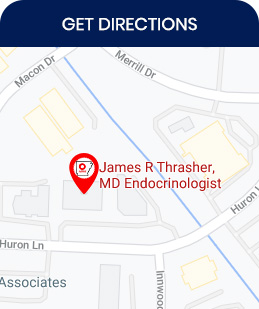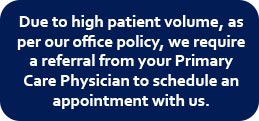Diabetes: Symptoms and Causes, Tests, and Treatments Q&A
At Arkansas Diabetes and Endocrinology Center, our team of medical professionals specializes in treating and managing your diabetes. Contact us today for more information about our services. We serve patients from Little Rock, AR and surrounding areas.


Table of Contents:
What are the main causes of diabetes?
How do I know if I’m diabetic?
What are the main tests for diabetes?
What are the warning signs of diabetes?
What is the best treatment for diabetes?
Diabetes affects millions of people all over the world, affecting their body’s ability to produce and regulate insulin. The two primary types are type 1 diabetes and type 2 diabetes. Type 1 occurs when the body’s immune system attacks and destroys the insulin-producing cells within the pancreas. Type 2 diabetes occurs when blood sugar (or blood glucose) in the body is at too high of a level.
Early research suggests that type 1 diabetes is caused by genetics, environmental factors, or a combination of both that result in the disease triggering inside the body. This type of diabetes is a long-term autoimmune condition that requires those who have it to inject insulin or use an insulin pump to make sure they sustain healthy levels in their bodies.
Type 2 diabetes, which is far more prevalent than its type 1 counterpart, can be caused by a myriad of factors such as poor lifestyle choices, genetic mutations, certain medications, hormonal diseases, and pancreatic damage. Certain ethnicities are also at higher risk of contracting type 2 diabetes.
Getting diagnosed as diabetic requires medical testing that can only be done by a doctor. Some sufferers may have symptoms that present quickly while others may not experience anything at all for a long period of time. This is why clinical testing is so important, especially if you have diabetes that runs in your family.
The following symptoms may be indicative of type 1 or type 2 diabetes:
– High levels of thirst
– Frequent urinating
– Unexplained mood swings
– Blurry vision
– Sores, cuts, or wounds that heal very slowly
– Increased levels of infections
– Unintentional weight loss
– Lethargy and/or weakness
– Ketones in the urine
If you’re experiencing these symptoms, it’s highly recommended that you book in to see your doctor as soon as possible.
Healthcare practitioners use a variety of tests to diagnose diabetes. The prescribed tests will vary depending on the patient’s current state of health and any medical conditions that may require different diagnostic methods.
The most common tests for diagnosing diabetes are:
– Fasting plasma glucose (FPG) test. Thismeasures your blood sugar level at a single point in time after a period of fasting for the most accurate results.
– A1C test. This is a blood test that provides your average levels of blood glucose over a three-month period.
– Random plasma glucose test. Similar to an FPG, this is for those who present symptoms of diabetes but whom doctors don’t want to wait the fasting period to test.
– Glucose challenge test. This is primarily used to test pregnant women for gestational diabetes. A sweet liquid is consumed by the patient and then blood glucose levels are tested one hour later.
– Oral glucose tolerance test. This test is useful in detecting type 2 diabetes, prediabetes, and gestational diabetes. It is not given as often as it requires fasting, multiple blood tests, and is often more expensive than the other options.
Your healthcare provider will be able to identify which test is the most suitable for you based on your symptoms and your unique medical needs.
Common warning signs of both type 1 and type 2 diabetes are:
– Frequent urination
– High levels of thirst
– Unintentional weight loss
– Constantly feeling hungry
– Blurry vision
– Numbness in the hands and/or feet
– Lethargy
– Dry skin
– Cuts, wounds, and/or sores that heal very slowly
– Persistent and/or reoccurring infections
– Ketones in the urine
People suffering from type 1 diabetes are also likely to experience nausea, vomiting, or stomach pains. Their symptoms often develop quickly and typically start to present in childhood, adolescence, or early adulthood.
Taking insulin or other diabetes medicines is often part of treating both type 1 and type 2 diabetes. As type 1 diabetes is a chronic medical condition, blood glucose levels need to be monitored consistently and insulin injections or pumps need to be used to ensure adequate blood sugar levels.
In addition to insulin and medication, lifestyle changes are also key in managing symptoms of diabetes. This includes making healthy food choices, reducing alcohol intake, getting plenty of physical activity, getting good quality sleep, and finding healthy management strategies to cope with stress.
If you have questions about your diagnosis or are looking for help to manage your symptoms, the professionals at Arkansas Diabetes and Endocrinology Center can help. Our team provides quality care at every step, ensuring that your treatment plan is suitable to your needs and lifestyle. Contact us today for more information about our services tailored to diabetic treatment. We serve patients from Little Rock AR, Conway AR, North Little Rock AR, Pine Bluff AR, Hot Springs AR, Benton AR, Sherwood AR, Russellville AR, Jacksonville AR, Cabot AR, Searcy AR, Bryant AR, Jonesboro AR, Forrest City AR, Magnolia AR, Camden AR, Malvern AR, Batesville AR, Arkadelphia AR, Clarksville AR, Monticello AR, Heber Springs AR, Morrilton AR, Stuttgart AR, Greenbrier AR, Sheridan AR and Vilonia AR.







